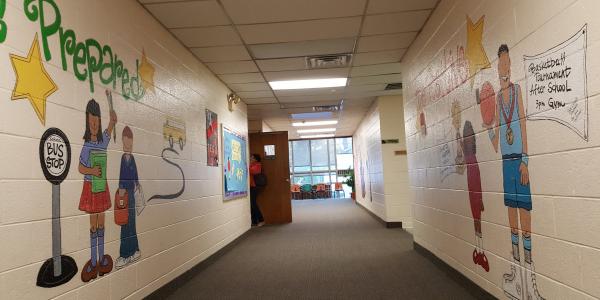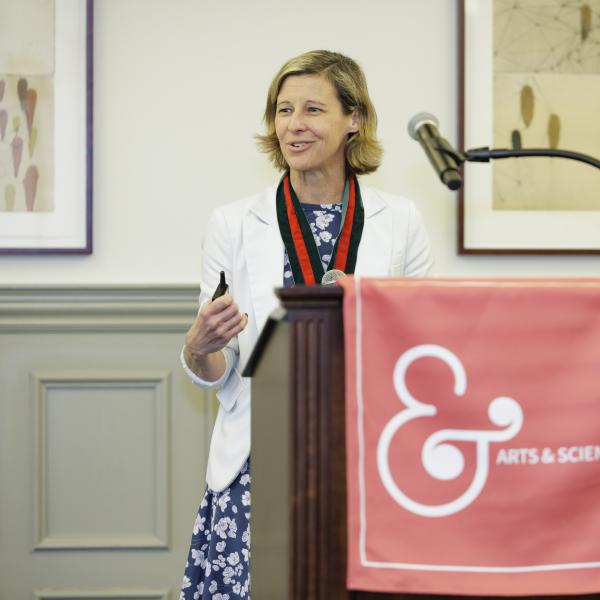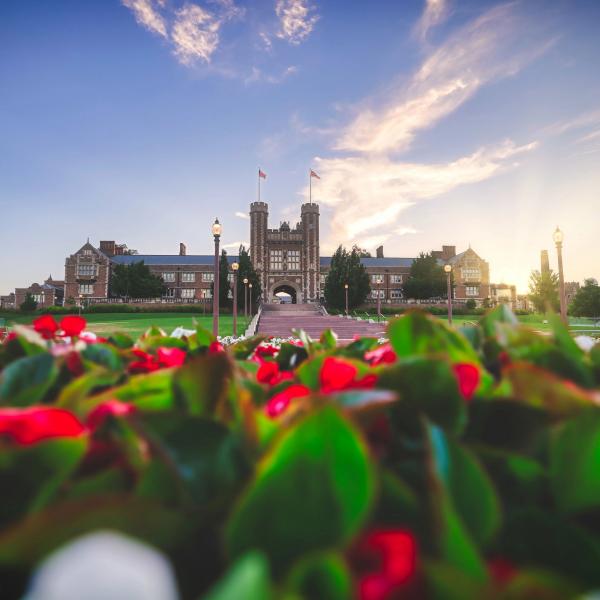Do charter schools perform better than traditional public schools? Does competition between schools really help students? Ebony Duncan Shippy, a sociologist of education, breaks down some common myths about charter schools and offers her advice for newly appointed education secretary Betsy DeVos.
Transcript:
CN: Thank you for listening to Hold That Thought. I’m Claire Navarro. In today’s episode, we’ll be hearing from Ebony Duncan Shippy.
EDS: I’m Ebony Duncan Shippy, assistant professor of education at Washington University in St. Louis.
CN: Lately in her work here at WashU, Duncan Shippy has been thinking a lot about charter schools and the idea of school choice. Back when she was a college student, the charter school movement was just taking off in Washington DC, where she was working as a school volunteer and tutor. To this day, she has this one clear memory from that time. She was walking some of her students home when they passed by a newly built charter school.
EDS: So just picture this. We're standing on one side of this maybe seven-foot chain-link fence -- gleaming, state of the art, just an incredible school. It's in the heart of southeast DC. And we're on the other side of the fence, and we're looking at the school. Literally looking at a playground that kids don't have access to. That my kids don't have access to.
CN: This moment raised a lot of questions in Duncan Shippy’s mind, questions that stuck with her over the years. For one:
EDS: What is the relationship of charter schools to neighborhoods?
CN: It turns out, when it comes to charter schools and what they mean for neighborhoods and for students, there are a lot of assumptions and misconceptions floating around. Before we start sorting through some of the myths, first let’s cover the basics. What are charter schools, exactly?
EDS: So these are publicly funded, tax funded but privately operated schools. Typically, a charter school founder will submit a proposal, akin to a grant, to the state or another authorizing agency to earn these charters, to operate a school.
CN: So like public schools, charter schools are tuition-free. But for the most part, they operate independently from local school districts - the details vary from state to state. Now, you’ve probably heard about charter schools a lot in the news this year. Betsy DeVos, who was appointed education secretary in February 2017, is a big fan. With all the attention, you might easily think that charter schools are everywhere, or will soon be everywhere. That’s not exactly true, says Duncan Shippy.
EDS: The charter school movement, as it's described, I think is smaller than people would imagine. So we have 99,000 public schools in the United States. And of those, 6.5% are charter schools. And that's actually grown exponentially since the early 2000s. It's still a fairly small share of schools, but that's not necessarily captured in the amount of attention that we give charter schools.
CN: And those 6 percent? They’re not evenly spread out across the country, or even across cities. Most charter schools, Duncan Shippy says, are found in lower-income areas.
EDS: Charter schools are often located in very high poverty communities of color. We see this in major charter school states pretty consistently. So we see this in California, Ohio, Arizona, Texas, Michigan, the list goes on.
CN: Lower-income areas tend to have lower-performing public schools, which brings us to another misconception about charter schools: the myth that charter automatically equals better. The reality isn’t so clear-cut.
EDS: Most of the time we don't see a consistent charter school effect, meaning that charter schools don't consistently outperform public schools. Public schools don't consistently outperform charters. There's usually a mix. It's mixed in a way that might be similar to how we think about public schools. Some are really great; some are terrible. Most are somewhere in between - good at some things, maybe not so good at others.
CN: The fact that charter schools aren’t light-years ahead of other schools likely isn’t a big problem for school choice advocates, like Betsy DeVos. After all, at least with charter schools around families can decide where to send their kids. School choice leads to competition between schools, and that’s good for everybody, right?
EDS: If you have charter schools in a district, the idea is that the education of the entire district will improve because failing schools will go away. They'll be closed. Charter schools are now stepping in and offering parents or families a better match for their students, in theory. Then the remaining public schools can innovate or somehow shift their practices so that they can continue to compete with these charter schools.
CN: This emphasis on the value of competition has become such a standard way to think about charter schools that I was surprised to learn that originally, the reasoning behind charters had nothing to do with competition.
EDS: The original idea of charter schools was developed by Ray Budd, who is a late professor of education at University of Massachusetts Amherst. The original idea of chartering education was for teachers. It was designed to give teachers more authority over making decisions about what they taught in a classroom and how they taught it. It was supposed to be experimental and supposed to be something that happened within a school. So the idea was that a group of teachers could say, we want to approach our English curriculum differently, and they could propose this to their principal and move forward with the program
CN: So wait, how did helping English teachers who wanted to mix things up transform into school competition? These seem like two very separate ideas here.
EDS: The short of it is, and I won't go into the full historical background, when Minnesota passed the first charter school law in 1991, the concept of chartering education was transformed into chartering entire schools. And eventually, at least according to critics of the movement, this idea of chartering entire schools transformed into supplanting public schools, that charter schools are being used to replace public schools in the United States.
CN: People who support charters would deny that claim, and instead say that school choice and competition is better for all schools. So charters have been around for a while now -- is it true? Does competition and choice lead to better schools overall?
EDS: With respect to these competitive effects, we're just not seeing that play out in our research. So we're not seeing indications that charter schools are producing this widespread competition in school districts that's leading to improvement for students across the board.
CN: To be clear, this doesn’t mean that charter schools are necessarily bad for students or neighborhoods – there are plenty of examples of really great charter schools. But when it comes to the benefit of competition, the data is inconclusive. We can’t prove that it works. Still, let’s back up for a minute to think about this all is supposed to work, in theory. Initially, part of the appeal of charter schools was that they could be shut down if they weren’t successful.
EDS: The idea is that a charter school can be more easily closed than a traditional public school for failing to improve student outcomes. Although, interestingly enough, the number one reason for charter school closures is financial mismanagement. It has nothing to do with student outcomes at all. Actually 40, I think I wrote this down, about 41 percent of charter schools closed due to financial mismanagement issues.
CN: And in the meantime, it’s become much more common to close traditional public schools because of poor academic performance. Now it may seem like a good idea to shut down a school that isn’t working, but Duncan Shippy is interested in what this really means for students and neighborhoods. Let’s say choice and competition really does lead to a public school admitting defeat, shutting its doors. What happens then?
EDS: There's research, recent reports from folks at University of Chicago and other institutions, which show that most students when their school closes for academic failure, they are not going to a better performing school. In Chicago, when we saw three different waves of recent mass closures, only 6 percent of students who were displaced by closures actually enrolled in a school with what we would call high test scores, so a high performing school. About 40 percent of students enrolled in schools that were just as bad as the schools that had closed. And what was probably even more disconcerting is that once a student in Chicago experienced closure once, they were more likely to experience another closure. So we already have students who - we don't know how long in their school career they've been assigned to failing schools or underperforming, schools that then close. And then a good number of the students experience this again.
CN: Of course this isn’t a great situations for students. A simple transfer isn’t going to help these kids succeed. In fact, sometimes the opposite is true.
EDS: So one of the things that we've seen in research is that student scores drop in a school when the school was slated for closure. When it becomes public knowledge that the school is going to close, we see it for math and for reading, their scores at the drop during that year.
CN: On top of that, school closures cause stress and disruption for families and entire communities.
EDS: So one of the things that we've seen in research is that student scores drop in a school when the school was slated for closure. When it becomes public knowledge that the school is going to close, we see it for math and for reading, their scores at the drop during that year.
CN: Knowing that competition isn’t leading to more successful schools overall, that charter schools are often the same quality as existing public schools, and that school closures can cause more harm than good – it all leads to the question, as a wider system, what are charter schools really offering?
EDS: Is it really choice if the quality of education is not improved, and if in some neighborhoods the only option is now a charter school. Some days I want to get rid of choice, the concept of choice in how we talk about it all together. I think it detracts from the larger issues. We forget to ask why families need choice to begin with.
CN: Here’s where we get to the final and perhaps biggest myth about charter schools: the myth that these schools are somehow going to save the entire American public education system. Duncan Shippy believes that in order for any type of school to succeed long term, charter or traditional, policy makers need to think bigger and look beyond the schools themselves.
EDS: You can't ignore the social context, and you can't ignore the ways in which these large social forces continue to affect schools, detrimentally affect schools. And so it's not enough to say, you know, X percentage of students in this neighborhood will now have choice. Nor do I think it's realistic to expect that charter schools or school choice more broadly will somehow transcend the social issues that other public schools are dealing with. Now I'm not saying that it would be easy. I don't think there's one quick fix for improving education in the United States. I think that, as an institution, it is tied to issues in family, it's tied to issues in the economy and government, and pretty much all of the other major social institutions we've talked about already. So I don't think it's a quick fix and I don't mean to suggest that it is. But I also don't think that, at least in my lifetime, I've witnessed the widespread support that would be necessary to begin to close some of these disparities.
CN: So, going forward, Duncan Shippy hopes to see less of a focus on competition, and more of a focus on context and the broader circumstances that students face, especially disadvantaged students. And that applies to all schools.
EDS: I mean, charter schools will be here for a while. I don't think charter schools are going anywhere anytime soon. And ultimately, they are a part of the public school landscape. And so I think part of what we have to do, and I'm including myself in this 'we,' is shift our perspective from whether charter schools work or not to under what conditions are they effective. I think ultimately that's kind of where we will have to go. I think we have to also have conversations about what we can do differently in our public schools. Because right now a lot of the conversation is, shut them down or basically motivate schools to shift their conduct with competition. I'm not convinced that either approach is the best for our education long term.
CN: For the time being, Duncan Shippy will continue to learn about how charter schools succeed and how they don’t. At the national level, we know where Betsy DeVos stands. To wrap up, I asked Duncan Shippy what one piece of advice she would give to Devos if she could.
EDS: So if I had to give her a piece of advice it would be to take a step back and really think about how choice, especially as the Trump administration has described the practice of choice, how that will help resolve social inequality in education.
CN: A big thank you to Ebony Duncan Shippy for joining Hold That Thought. For many more ideas to explore, please visit us at holdthatthought.wustl.edu.




